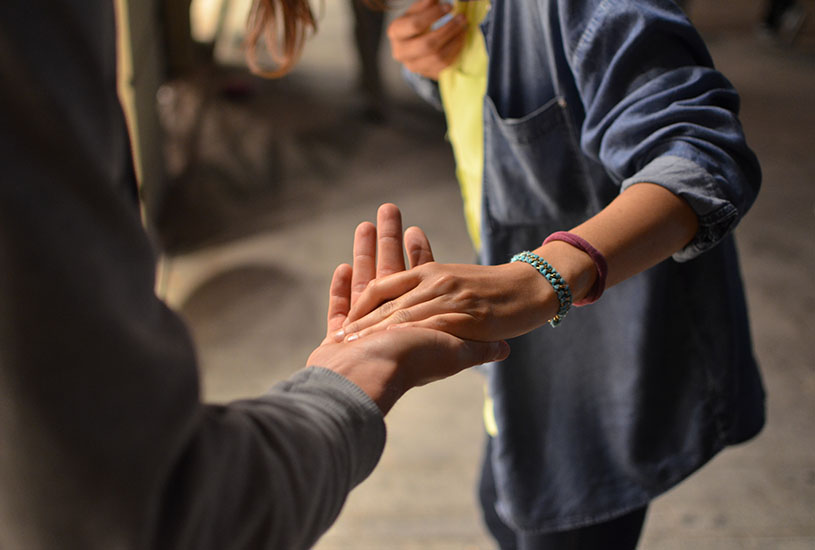A team of Deakin researchers is seeking ways to improve support for cancer survivors and their carers.
Around one million Australians are living with cancer – and every day there are 367 new cancer diagnoses.
Researchers at Deakin’s Centre for Quality and Patient Safety Research (QPS) are widening their research net by understanding the experiences of cancer survivors and their caregivers, to improve health outcomes for both groups.
[testimonial_text]Age is a main risk factor for cancer, but with improved treatment options, cancer is now considered a chronic disease.[/testimonial_text]
[testimonial_picture name=”Professor Trish Livingston” details=”Associate Dean (Research) Faculty of Health”]
 [/testimonial_picture]
[/testimonial_picture]“With increased survival rates, we need to improve our understanding of the psychosocial elements, symptom management, and service delivery and how these elements impact on people with cancer and caregivers,” she said.
Dr Anna Ugalde, Alfred Deakin Research Fellow at QPS, explained that studies of patient experience have found there can be a range of unmet needs and caregivers also experience burden as they assist in providing support for a person with cancer. Dr Ugalde said some cancer survivors have a particularly hard time coping with symptoms and treatment.
“We are seeking to understand what kind of support and information people with different types of cancers need to manage their symptoms, and when they need it,” she said.
“Caregiver distress is high and in many cases higher than the people with cancer,” said Dr Ugalde. “There are lots of potential reasons for this. As a group, caregivers don’t tend to ask for help. They are very focused on the patient and don’t consider their own needs as important, or they don’t want the attention taken away from the person with the diagnosis when they are at appointments.”
Better support mechanisms could improve health outcomes for patients and caregivers, both during and after cancer treatment.
[testimonial_text]Through a variety of approaches, we are currently working to establish the best way of supporting caregivers, with the aim of developing guidelines based on expert consensus.[/testimonial_text]
[testimonial_picture name=”Dr Anna Ugalde” details=”Alfred Deakin Research Fellow at QPS”]
 [/testimonial_picture]
[/testimonial_picture]This work is funded by the Victorian Cancer Agency and results are expected later in 2017. The results will be used to prepare guidelines that will be distributed to health organisations and clinicians.
“It can’t be a one-size-fits-all approach – and what is provided needs to be targeted and embedded in clinical settings because of the diversity of patient and carer needs,” explained Dr Ugalde.
“We have done some work mapping the caregiving experience, and exploring how this may be influenced by the patient’s symptoms.
“Caregivers are a very diverse group of people. We know that people who most need support are often less likely to ask for it. This is a challenge for health and community services.
“We are working on developing a system for predicting the factors that predispose people needing support, and ensuring that resources are targeted more actively with supportive information at the right time.”
People with cancer may be anywhere on their cancer journey – newly diagnosed, enduring treatment, living with the impact of treatment, or survivors receiving ongoing checkups for disease recurrence. There are multiple ways they – and their caregivers – interact with health services and health professionals.
“Mobile technology may be one way to support people with cancer and their carers. For example, we are looking at the role of technology and with funding from a NHMRC partnership grant scheme, we are evaluating whether a smartphone application can assist with monitoring the impact of cancer treatment for patients across several health services,” said Professor Livingston.
Recruitment has commenced at Barwon Health, Eastern Health and Epworth Healthcare.
Another study funded by NHMRC investigated the role of the Cancer Council Victoria Helpline (131120) to provide information and support to caregivers during a patient’s treatment.
“We found that the majority of caregivers reported the telephone outcall program supported them and 90 per cent used the information given to assist them in providing care. Distress levels decreased significantly between the first and third calls to caregivers, and family and practical issues were discussed more often by younger compared to older carers,” said Professor Livingston.
“This study also showed that telephone support is an efficient and manageable way to help caregivers as access to information and counselling is not restricted by geographic boundaries,” said Dr Leila Heckel, who was the study’s project manager.
Providing this evidence is important for clinicians, health services and policymakers to enable them to make judgments about the value and impact of information and support services in their clinical and community settings. Understanding which models of care or technologies work best, the evidence gaps and the extent to which people with cancer and their carers can manage in the community is vital to improving cancer care.



